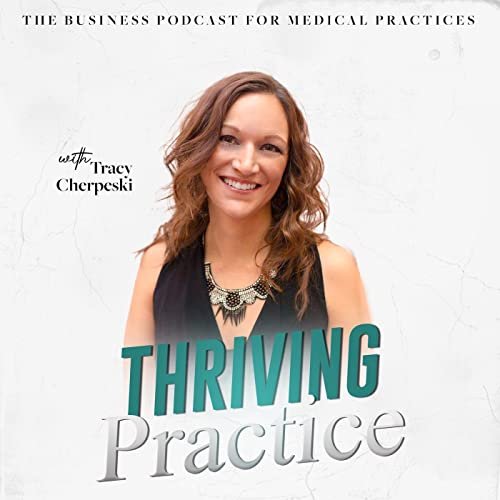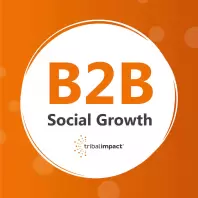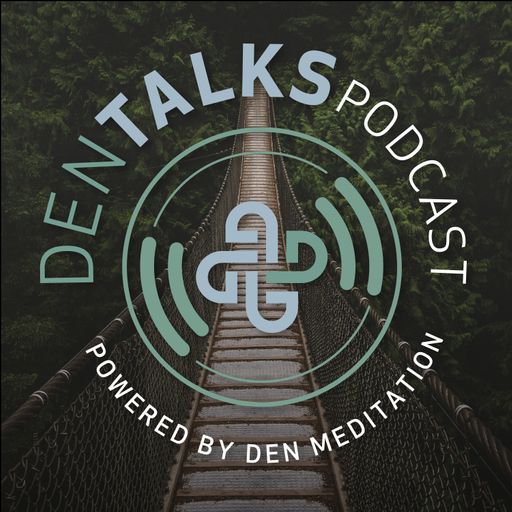
Thriving Practice with Tracy Cherpeski

Basic Member
Ownership Verification Center
And, schedule a video verification call with us. Don't worry it takes a few minutes only :)
Latest Episodes
Teaching Burnout Prevention While Burning Out: What Actually Saves Us, EP 216
In this raw and honest solo episode, Tracy Cherpeski shares what happened when the burnout prevention expert found herself sliding into Stage 4 burnout. During one of the busiest seasons of her career - launching Thriving Practice Community, facilitating a CME-accredited wellness retreat, and developing new programs - Tracy experienced firsthand the insidious nature of burnout she teaches others to prevent. But this isn't just a story about struggle. It's about what actually works: the difference between near-burnout and full burnout, why clarity is 50% of prevention, and why community isn't optional but essential infrastructure for sustainable practice. Through stories from a powerful San Jose gathering and TPC's inaugural Community of Practice session, Tracy reveals what healthcare leaders are truly hungry for and what most of us are trying to survive without.
Click here for full show notes
Is your practice growth-ready? See Where Your Practice Stands: Take our Practice Growth Readiness Assessment
Episode Highlights
- The irony of teaching burnout prevention while experiencing Stage 4 burnout during an intense launch season
- What happened at the San Jose CME-accredited wellness event when physicians finally had space to connect
- The "worst wellness advice ever" improv game that revealed the band-aid solutions healthcare leaders are tired of hearing
- Dr. Robert's story: navigating impossible income swings, two practice models, and life-altering decisions completely alone
- Gianna's journey: why even successful practice owners need community to navigate next-level growth decisions
- The WHO's 12 stages of burnout and why Stages 1-4 look exactly like the "model physician"
- Why clarity about your WHY is at least 50% of burnout prevention
- How community serves as prevention infrastructure, not just a cure for burnout
- The difference between three days of intentional rest and three months of burnout recovery
Memorable Quotes
"The irony was not lost on me. And that's the thing about burnout - it's insidious. You don't see it creeping up until suddenly, you're in it."
"That feeling of 'I'm keeping all these plates spinning but I've lost sight of why I'm in the circus to begin with.'"
"My body basically said, 'Okay, you pushed through the event, now you're STOPPING whether you like it or not.'"
"The 'worst advice' they were sarcastically giving? That WAS their lived experience."
"They grabbed onto connection like oxygen."
"And that's what I mean by isolation at the survival level. It's not that he's not capable - he's proven he is. It's that he's trying to navigate impossible complexity without anyone who actually understands the terrain."
"Success doesn't eliminate the need for community. It just changes what you need community FOR."
"Clarity is at least 50% of burnout prevention."
"Community isn't optional. It's infrastructure."
"Isolation intensifies everything. The doubt. The comparison. The overwhelm. The weight of decisions."
"That's the power of community. Not as a cure for burnout, but as prevention. As the structure that keeps you from getting there in the first place."
"This isn't about waiting until you 'have it all figured out' to connect with peers. It's about recognizing that connection IS how you figure it out."
Closing
Tracy's vulnerability in this episode is a gift. She didn't just teach us about burnout prevention - she showed us what it looks like to catch yourself at Stage 4, course-correct with clarity and community, and come out stronger. If you'refeeling isolated in your practice, making high-stakes decisions alone, or wondering if you have time for community, this episode is your reminder: you don't have time NOT to invest in connection and clarity. Because without them, you'llkeep spinning until your body forces you to stop.
Tracy’s Bio:
Tracy Cherpeski, MBA, MA, CPSC (she/her/hers) is the Founder of Tracy Cherpeski International and Thriving Practice Community. As a Business Consultant and Executive Coach, Tracy helps healthcare practice owners scale their businesses without sacrificing wellbeing. Through strategic planning, leadership development, and mindset mastery, she empowers clients to reclaim their time and reach their potential. Based in Chapel Hill, NC, Tracy serves clients worldwide and is the Executive Producer and Host of the Thriving Practice podcast. Her guiding philosophy: Survival is not enough; life is meant to be celebrated.
Connect With Us:
Buy-Ins, Buyouts, and Why Your Practice Needs a Plan B, Featuring Debra Phairas, EP 215
In this episode, Tracy sits down with Debra Phairas, a physician practice management consultant with over 40 years of experience working with more than 2,300 medical practices. They discuss the often-overlooked topics of buy-ins, buyouts, and exit strategies for private practices. Debra shares hard-earned wisdom from four decades in the field, including real stories that illustrate why planning ahead isn't optional—it's essential.
Click here for full show notes
See Where Your Practice Stands: Take our Practice Growth Readiness Assessment
Episode Highlights
- The Buy-In Advantage: Why buying into an established practice can be smarter than starting from scratch, and what to look for in a shareholder agreement
- Show You're Partner-Worthy: How young doctors can demonstrate value through marketing activities and relationship-building with referring physicians
- The Uncomfortable Necessities: Why every practice owner needs a will, living trust, buy-sell agreement, and key person insurance—illustrated with real stories of practices that didn't plan ahead
- Transparency is Everything: How open communication between senior and junior partners prevents dissatisfaction and builds lasting trust
- The Exit Strategy: Planning 2-5 years ahead for retirement or sale, and why waiting until you're 80 is too late
- The Private Practice Renaissance: Why more young doctors are choosing private practice ownership post-COVID
Memorable Quotes
"Transparency is really the key to good working relationships. The more that you know about the practice when you're coming in, the better decisions you can make."
"You put a dollar sign in front of math and you all freak out. You did way harder math to get into medical school. This is really easy—it's just simple math."
"The courage to communicate, confront, and compromise are my watchwords that I give all my doctors."
"At least when you buy in, you will have something when you leave. If you're just an employee, you get nothing."
"I've been so encouraged this year. I have done more new startup practice meetings than I did for the last three years. So many young doctors are saying they're ready to start their own practice—and that's something to celebrate."
Debra Phairas reminds us that running a private practice doesn't have to be as daunting as it seems. With proper planning, transparent communication, and the right guidance, physicians can build sustainable practices that provide both professional satisfaction and financial security. Whether you're just starting out or planning your exit, the key is to start those conversations now—not when it's too late.
Guest Bio:
Debra Phairas is President of Practice & Liability Consultants, LLC, a nationally recognized firm specializing in practice management and malpractice prevention. With over 40 years of experience, she has consulted with more than 2,300 medical practices across all specialties. Her expertise includes practice startups, financial analysis, practice valuations, buy-ins and buyouts, strategic planning, and partnership agreements. Debra holds a BS from Michigan State University and completed graduate work in Health Services Administration at Golden Gate University. She is a sought-after speaker who has presented seminars nationwide for medical associations and specialty societies, and is certified as an Expert Witness in California, Arizona, and Washington.
Find Debra:
See Where Your Practice Stands: Take our Practice Growth Readiness Assessment
Connect With Us:
The Practice Owner's Guide to Quarterly Planning (and Staying Ahead of the Chaos) - A Special Snack Episode, EP 214
Overview: Each quarter brings predictable patterns in patient behavior and practice operations, yet many healthcare providers find themselves constantly reacting instead of planning. In this snack episode, Tracy Cherpeski shares her insights on how practice owners can leverage quarterly shifts to build sustainable growth and avoid burnout. From Q1's deductible reset surge to Q4's strategic planning opportunities, Tracy offers a roadmap for thriving year-round.
Click here for full show notes
Episode Highlights:
- How to prepare for Q1's patient surge and deductible reset without overwhelming your team
- Why Q2 is the perfect time for mid-year assessments and what metrics actually matter
- Using Q3's momentum (or downtime) strategically instead of just coasting through summer
- The competitive advantage of Q4 planning over end-of-year scrambling
- Understanding the "hustle and glide" mentality for sustainable practice growth
- The Time Leadership Quadrant: A practical framework for triaging what needs your attention now
Memorable Quotes:
- "What you track, you can manage."
- "You don't want to make your adjustments in the busy time. It's the analogy of getting caught with your pants around your ankles—it's not a good time to try to run if you are bound."
- "If you take some time in Q3 to plan, you'll be at least a quarter ahead of your competition."
- "Embrace the hustle and glide mentality—we hustle when it's truly hustle time, and when it's not, you slow down, become more reflective, and recharge your batteries."
- "The practice owners who thrive year-round know when to work on the business instead of always being in it."
If you're ready to stop riding the quarterly roller coaster and start planning for predictable success, visit thrivingpracticecommunity.com to schedule a consultation with Tracy today.
Is your practice growth-ready? See Where Your Practice Stands: Take our Practice Growth Readiness Assessment
Miranda’s Bio:
Miranda Dorta, B.F.A. (she/her/hers) is the Manager of Operations and PR at Tracy Cherpeski International. A graduate of Savannah College of Art and Design with expertise in writing and creative storytelling, Miranda brings her skills in operations, public relations, and communication strategies to the Thriving Practice community. Based in the City of Oaks, she joined the team in 2021 and has been instrumental in streamlining operations while managing the company's public presence since 2022.
Tracy’s Bio:
Tracy Cherpeski, MBA, MA, CPSC (she/her/hers) is the Founder of Tracy Cherpeski International and Thriving Practice Community. As a Business Consultant and Executive Coach, Tracy helps healthcare practice owners scale their businesses without sacrificing wellbeing. Through strategic planning, leadership development, and mindset mastery, she empowers clients to reclaim their time and reach their potential. Based in Chapel Hill, NC, Tracy serves clients worldwide and is the Executive Producer and Host of the Thriving Practice podcast. Her guiding philosophy: Survival is not enough; life is meant to be celebrated.
Connect With Us:
Why "Work Smarter Not Harder" Is Terrible Advice (And What Actually Works), Pt. 3, EP 213
In this powerful conclusion to our three-part time leadership series, Tracy tackles one of the most repeated—and least helpful—pieces of productivity advice: "work smarter, not harder." Through the compelling story of Dr. David, an ER physician turned regenerative medicine practice owner, you'll discover why this platitude fails and what to do instead. Tracy introduces a concrete methodology for strategic work allocation that helped Dr. David redirect 15 hours per week from low-value interruptions to high-value work that only he could perform. The result? Substantial revenue growth, improved patient flow, and a more confident, self-sufficient team—all while working the same number of hours.
Click here for full show notes
Is your practice growth-ready? See Where Your Practice Stands: Take our Practice Growth Readiness Assessment
Download the Time Leadership Delegation Tool
Episode Highlights
- Why "work smarter" is useless advice: It offers zero actionable guidance on how to actually work differently
- The critical distinction: Time leadership isn't about getting extra free time—it's about strategic reallocation to work that only you can do
- Dr. David's breakthrough: Discovering he spent 15 hours weekly on work that didn't require his expertise
- The three strategic changes: Training staff for self-sufficiency, redesigning clinical schedules around highest-value work, and fixing the scheduling system
- The scheduling protocol that changed everything: How offering two specific appointment options eliminated chaos and six weekly interruptions
- Real results: How 12 redirected hours created substantial revenue increases and improved practice flow
- The Discovery-Analysis-Action framework: Tracy's proven methodology for lasting change
Memorable Quotes
"Time leadership isn't about efficiency—it's about effectiveness. It's not about doing things faster—it's about doing the right things and ensuring the wrong things aren't on your plate at all."
"The question isn't 'how do I work smarter?' The question is 'what work should I actually be doing, and what needs to stop being on my plate?'"
"You're not getting 'extra' time. You're reclaiming strategic capacity that's currently being drained by the wrong work."
"Awareness without action is just expensive entertainment. You can understand time leadership intellectually and still be overwhelmed six months from now."
"I finally understand the difference between being busy and being effective. I'm working the same number of hours, but the work I'm doing is completely different." —Dr. David
This episode delivers the practical implementation guide you've been waiting for in the time leadership series. Whether you're a physician, dentist, or other healthcare practice owner, Tracy's methodology for strategic work allocation will help you stop playing every instrument in the orchestra and start conducting. Visit the show notes for your complimentary practice assessment strategy session and take the next step toward building the practice you envisioned.
Is your practice growth-ready? See Where Your Practice Stands: Take our Practice Growth Readiness Assessment
Download the Time Leadership Delegation Tool
Tracy’s Bio:
Tracy Cherpeski, MBA, MA, CPSC (she/her/hers) is the Founder of Tracy Cherpeski International and Thriving Practice Community. As a Business Consultant and Executive Coach, Tracy helps healthcare practice owners scale their businesses without sacrificing wellbeing. Through strategic planning, leadership development, and mindset mastery, she empowers clients to reclaim their time and reach their potential. Based in Chapel Hill, NC, Tracy serves clients worldwide and is the Executive Producer and Host of the Thriving Practice podcast. Her guiding philosophy: Survival is not enough; life is meant to be celebrated.
Connect With Us:
Stop Responding to Fake Urgencies: How to Actually Protect Your Strategic Time, Pt. 2, EP 212
Overview: In this episode of Thriving Practice, Tracy Cherpeski tackles one of the biggest challenges healthcare practice owners face: protecting strategic thinking time in an environment where everything feels urgent. Through the compelling story of Dr. David—an ER physician who opened a regenerative medicine practice—you'll discover why your blocked strategic planning time keeps getting hijacked, and learn the exact framework for distinguishing between genuine urgency and habitual urgency. This is part two of the time leadership series, and it's essential listening for any practice owner who's ever wondered why their "do not disturb" time never actually happens.
Click here for full show notes
Download the Time Leadership Workbook
Episode Highlights:
- Why healthcare practice owners are uniquely vulnerable to losing strategic thinking time
- The difference between urgency in clinical care versus practice operations
- Dr. David's breakthrough: discovering 15 hours per week of delegable tasks through time tracking
- The three questions that help you triage your time like an ER triages patients
- The ABCD prioritization framework for categorizing tasks and interruptions
- How to create decision-making frameworks that eliminate recurring interruptions
- Why tracking your time for just three days can reveal patterns you can't unsee
Memorable Quotes:
"Your strategic thinking time doesn't disappear because healthcare is unpredictable. It disappears because you haven't distinguished between what's genuinely urgent and what just feels urgent."
"In clinical settings, urgency often correlates with importance. But here's the trap: you've imported that same urgency response pattern into every aspect of your practice. And in the business side of healthcare, urgency rarely equals importance."
"You cannot fix what you cannot see."
"The question isn't 'is this urgent?' The question is 'is this urgent and only I can handle it right now?' That's a very different standard."
Ready to reclaim your strategic thinking time? This episode gives you the audit framework and prioritization system to start making immediate changes. Download the Time Leadership Delegation workbook and complete your three-day time audit—then join us for part three, where Tracy shows you how to turn that data into freed-up time.
Is your practice growth-ready? See Where Your Practice Stands: Take our Practice Growth Readiness Assessment
Tracy’s Bio:
Tracy Cherpeski, MBA, MA, CPSC (she/her/hers) is the Founder of Tracy Cherpeski International and Thriving Practice Community. As a Business Consultant and Executive Coach, Tracy helps healthcare practice owners scale their businesses without sacrificing wellbeing. Through strategic planning, leadership development, and mindset mastery, she empowers clients to reclaim their time and reach their potential. Based in Chapel Hill, NC, Tracy serves clients worldwide and is the Executive Producer and Host of the Thriving Practice podcast. Her guiding philosophy: Survival is not enough; life is meant to be celebrated.
Connect With Us:
The Isolation Trap: How Independent Providers Can Build Their Professional Village – A Special Snack Episode, EP 211
In this candid snack episode, Miranda and Tracy explore the critical importance of building intentional professional community as a practice owner. Drawing from Tracy's recently updated blog post "Choosing Your Village" (originally written in 2011), they discuss why independent healthcare providers need more than clinical expertise—they need a village of people who understand the unique challenges of practice ownership.
Click here for full show notes
Episode Highlights
- Why community matters more now: The impact of digital connection versus genuine human connection, and how COVID increased isolation for independent practice owners
- Village vs. support network: Understanding the difference between personal support and professional community
- Energy audit for relationships: How to identify which connections drain you and which ones light you up—and what to do about it
- Recovery from burnout: Practical steps for practice owners running on empty, including the WHO's 12 stages of burnout
- Incremental progress over perfection: Why starting small (like drinking enough water) creates sustainable change
Memorable Quotes
"I think we are more digitally connected and yet feeling more disconnected. For all humans, we're really feeling that, and COVID really increased our sense of isolation."
"I need professional friends. I need professional colleagues in my world, other business owners... other crazy people who can show you that what you're going through is common, maybe even normal."
"If I'm feeling this way with lots of people, it might be time for me to take a nap and have a snack."
"Mindful means slowing down. Sometimes literally putting my hand on my heart and just checking in."
"It's better, it's more sustainable to start with something that you know you can do. I know I can carry my water bottle around and sip on it all day."
Closing
This episode serves as a gentle reminder that practice ownership doesn't have to be a solitary journey. Whether you're evaluating your current professional relationships or looking to build new connections, the Thriving Practice community is here to support you. Visit thrivingpracticecommunity.com to learn more about working with Tracy and joining a village that truly gets it.
Is your practice growth-ready? See Where Your Practice Stands: Take our Practice Growth Readiness Assessment
Miranda’s Bio:
Miranda Dorta, B.F.A. (she/her/hers) is the Manager of Operations and PR at Tracy Cherpeski International. A graduate of Savannah College of Art and Design with expertise in writing and creative storytelling, Miranda brings her skills in operations, public relations, and communication strategies to the Thriving Practice community. Based in the City of Oaks, she joined the team in 2021 and has been instrumental in streamlining operations while managing the company's public presence since 2022.
Tracy’s Bio:
Tracy Cherpeski, MBA, MA, CPSC (she/her/hers) is the Founder of Tracy Cherpeski International and Thriving Practice Community. As a Business Consultant and Executive Coach, Tracy helps healthcare practice owners scale their businesses without sacrificing wellbeing. Through strategic planning, leadership development, and mindset mastery, she empowers clients to reclaim their time and reach their potential. Based in Chapel Hill, NC, Tracy serves clients worldwide and is the Executive Producer and Host of the Thriving Practice podcast. Her guiding philosophy: Survival is not enough; life is meant to be celebrated.
Connect With Us:
Stop Managing Your Time: Why Healthcare Practice Owners Need Time Leadership, Pt. 1 EP 210
In this first episode of our three-part Time Leadership series, Tracy Cherpeski tackles why traditional productivity systems fail healthcare practice owners. If you've tried every time management technique only to feel more overwhelmed, this episode reveals the real problem: you've been applying employee productivity frameworks to a practice owner's reality. Tracy introduces the concept of time leadership—a strategic approach designed specifically for healthcare professionals balancing clinical excellence with business sustainability.
Click here for full show notes
Click here to download the Time Leadership Delegation Workbook
See Where Your Practice Stands: Take our Practice Growth Readiness Assessment
Episode Highlights
- The Time Management Trap: Why productivity systems designed for corporate employees don't work for practice owners juggling patient care and business leadership
- Dr. Sarah's Story: How a successful family medicine physician discovered she was efficiently managing the wrong work—and what changed when she shifted her focus
- Time Management vs. Time Leadership: The critical distinction between doing things efficiently and doing the right things strategically
- The Orchestra Metaphor: Why you need to conduct your practice rather than play every instrument yourself
- Delegation Beyond Admin: Understanding what truly requires your clinical expertise versus what you're doing out of habit
Memorable Quotes
"You don't have a time management problem. You have a time leadership opportunity."
"Time management is about efficiency—doing things right. Time leadership is about effectiveness—doing the right things."
"Sarah wasn't managing her time poorly. She was managing the wrong work."
"Real acceptance is powerful—making peace with what you genuinely cannot change while focusing your energy on what you can. Resignation is giving up."
"The question isn't 'how do I manage all these tasks more efficiently?' The question is 'what am I conducting versus what am I trying to play myself?'"
This episode sets the foundation for a complete mindset shift around how healthcare practice owners approach their time. Tracy challenges listeners to stop blaming themselves for failed productivity systems and instead recognize that they need a framework built for their unique reality. Download the Time Leadership Delegation workbook and complete the foundation work before episode two, where we'll explore the Open Time Audit and identify exactly where your strategic thinking time is being hijacked.
See Where Your Practice Stands: Take our Practice Growth Readiness Assessment
Tracy’s Bio:
Tracy Cherpeski, MBA, MA, CPSC (she/her/hers) is the Founder of Tracy Cherpeski International and Thriving Practice Community. As a Business Consultant and Executive Coach, Tracy helps healthcare practice owners scale their businesses without sacrificing wellbeing. Through strategic planning, leadership development, and mindset mastery, she empowers clients to reclaim their time and reach their potential. Based in Chapel Hill, NC, Tracy serves clients worldwide and is the Executive Producer and Host of the Thriving Practice podcast. Her guiding philosophy: Survival is not enough; life is meant to be celebrated.
Connect With Us:
The Oxygen Advantage: Building a Profitable EWOT Practice, Featuring Brad Pitzele, EP 209
In this episode, Brad Pitzele shares his journey from chronic illness survivor to EWOT advocate and business owner. Facing autoimmune issues and Lyme disease that left him struggling with brain fog, pain, and 50+ symptoms, Brad discovered Exercise with Oxygen Therapy when traditional treatments failed. After building his own system and experiencing dramatic improvements, he founded 1000 Roads to make EWOT more accessible. The conversation explores the science behind EWOT, its applications for chronic illness and athletic recovery, and the business case for healthcare providers looking to integrate this therapy into their practices.
Click here for full show notes
Key Highlights:
- EWOT uses concentrated oxygen during exercise to improve cellular oxygenation and reduce inflammation
- Research dating to the 1960s shows benefits for everything from cancer to autoimmune conditions
- Systems start at under $2,500 with quick ROI potential through session-based pricing
- Minimal staff oversight required - front office staff can manage patient setup
- Effective for chronic illness, athletic recovery, and general wellness applications
- Pairs well with other therapies like red light therapy for enhanced benefits
Memorable Quotes: "The hardest part about selling EWOT is that it does so many great things, it's almost like not believable."
"When you do EWOT, you're not just using the red blood cells, you're actually saturating the blood plasma, which is about a thousand times thinner than a red blood cell and can get through those blockages."
"70% of the detoxification that you do in your body is actually through your lungs."
Brad's combination of personal experience and engineering background provides unique insights into both the therapeutic potential and practical implementation of EWOT, making this episode valuable for any healthcare provider exploring innovative treatment modalities.
Brad’s Bio:
Brad Pitzele is the founder of One Thousand Roads and a chronic illness survivor who discovered Exercise with Oxygen Therapy (EWOT) when facing severe autoimmune diseases, chronic fatigue, and cancer. After being unable to afford existing EWOT systems ranging from $5,000-$25,000, Brad used his engineering background to build his own system, experiencing dramatic health improvements that inspired him to launch One Thousand Roads in 2016. The company focuses on providing affordable, high-quality wellness products for people with chronic illnesses, with a mission to help one thousand people recover their health and quality of life. Eight years later, One Thousand Roads has helped thousands of customers on their wellness journeys while making EWOT more accessible through systems starting under $2,500.
Find Brad:
See Where Your Practice Stands: Take our Practice Growth Readiness Assessment
Connect With Us:
The 'Always On' Trap: Why Healthcare Providers Must Learn to Turn Off – A Special Snack Episode, EP 208
Healthcare providers excel at caring for others but often struggle with self-care. In this honest conversation, Tracy Cherpeski shares why the 'always on' mindset is actually counterproductive and reveals practical strategies for breaking free from energy-draining habits.
Key Highlights:
- Why the word "should" creates unnecessary guilt and obligation
- How your well-being directly impacts your team's performance
- The danger of checking your phone first thing in the morning
- Why email shouldn't be the first task of your day
- The 60-day rule for creating lasting habits
- Building flexibility into habit formation to avoid perfectionism pitfalls
Click here for full show notes
Memorable Quotes: "Do not should on yourself or others—that word is so laden with judgment."
"If you're not right, ain't nothing right in your business."
"When I'm stressed, I get spacey, and when I'm spacey, that means you have to work harder."
"We need to give ourselves permission to turn it off and to step away. That's really, really, really hard."
This episode offers actionable insights for healthcare providers ready to prioritize their well-being without compromising patient care. Sometimes the best thing you can do for your practice is take better care of yourself.
Is your practice growth-ready? See Where Your Practice Stands: Take our Practice Growth Readiness Assessment
Miranda’s Bio:
Miranda Dorta, B.F.A. (she/her/hers) is the Manager of Operations and PR at Tracy Cherpeski International. A graduate of Savannah College of Art and Design with expertise in writing and creative storytelling, Miranda brings her skills in operations, public relations, and communication strategies to the Thriving Practice community. Based in the City of Oaks, she joined the team in 2021 and has been instrumental in streamlining operations while managing the company's public presence since 2022.
Tracy’s Bio:
Tracy Cherpeski, MBA, MA, CPSC (she/her/hers) is the Founder of Tracy Cherpeski International and Thriving Practice Community. As a Business Consultant and Executive Coach, Tracy helps healthcare practice owners scale their businesses without sacrificing wellbeing. Through strategic planning, leadership development, and mindset mastery, she empowers clients to reclaim their time and reach their potential. Based in Chapel Hill, NC, Tracy serves clients worldwide and is the Executive Producer and Host of the Thriving Practice podcast. Her guiding philosophy: Survival is not enough; life is meant to be celebrated.
Connect With Us:
Bio of Thriving Practice with Tracy Cherpeski
Thriving Practice with Tracy Cherpeski is a podcast designed to support practice owners in building successful and sustainable businesses while maintaining their focus on providing excellent care. Hosted by Tracy Cherpeski, an executive coach and consultant specializing in mindset mastery and time leadership, the podcast offers valuable insights and strategies to help practitioners thrive in their professional and personal lives.
Each week, Tracy engages in conversations with experts from the medical and dental fields, exploring various aspects of practice management, growth, and success. By interviewing industry professionals, the podcast delves into topics such as scaling businesses, overcoming challenges, and aligning personal values with business goals. Listeners gain practical advice and actionable wisdom that can be applied to their own practices.
Tracy also shares her own insights and expertise in solo episodes. Through these episodes, she provides guidance on mindset mastery and time leadership, empowering listeners to enhance their productivity, prioritize effectively, and create a thriving practice that aligns with their desired lifestyle.
Similar Podcasts
B2B Social Growth: Your Weekly B2B Social Media Podcast, hosted by Sarah Goodall.
Affiliated: ClickBank's Official Affiliate Marketing Podcast, hosted by Thomas McMahon and Kyle Kostechka.
The Yoga Teacher Resource Podcast, hosted by Mado Hesselink.
"Climb In Consulting" podcast interviews leaders in the management consulting field.
DENtalks powered by DEN Meditation Podcast, Hosted by Tal Rabinowitz.








